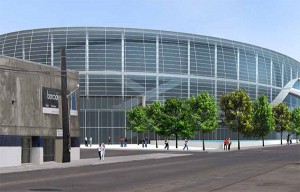
People who say ‘Let the chips fall where they may’ usually figure they will not be hit by a chip — Bernard Williams
Two years after an 11th hour agreement was reached to keep the Phoenix (now Arizona) Coyotes in town, the Glendale city council took the first step to unravel that decision, voting 5-2 to cancel the 15-year, $225 million deal. Last Friday, a Maricopa County Superior Court judge granted a temporary injunction in favor of the team, setting the next court date for June 29th.
No surprise a Judge has granted Coyotes an injunction temporarily restraining Glendale's cancellation of lease pending resolution of case.
— Eric Macramalla (@EricMacramalla) June 12, 2015
The battle to keep the Coyotes in the desert has experienced twists and turns ever since former majority owner Jerry Moyes filed for bankruptcy protection in 2009. A synopsis of the significant events occurring since the team moved to Glendale, Arizona can be seen here.
How might this affect Seattle’s chances of landing an NHL team?
The Coyotes almost moved to Seattle in 2013
Former Seattle Mayor Mike McGinn revealed that had the Glendale city council not ratified a lease agreement with Renaissance Sports & Entertainment by a narrow 4-3 margin, the Coyotes would have immediately moved to Seattle, playing up to three seasons at Key Arena while a new 18,0000-seat arena was built.
Although a long-awaited Environmental Impact Statement cleared the way for construction to begin, the Memorandum of Understanding between investor Chris Hansen’s group (ArenaCo), the city of Seattle and King County requires an NBA team to be secured prior to the issuance of up to a total of $200 million of bonds to finance the $490 million project.
So far, no dice for Seattle. While the NHL has indicated great interest in placing a team in the Emerald City — apparently even the Coyotes themselves back in 2013 — the difficult arena process has clearly slowed efforts to get it built. That being said, the odds of a breakthrough have now essentially doubled with the advent of two recent events.
The principals may be open to re-doing the MOU for a hockey-first option

The political wheels turn methodically in almost every major American city, but perhaps nowhere do they grind quite so slowly as in Seattle. However, Mayor Ed Murray has gone on record stating that he would seek approval from the Seattle city council to amend the MOU to allow for a hockey-first option. The math would almost certainly need to be adjusted to require more investor cash and less city/county financing, but with the caliber of players involved, it could be done.
Why it could be an opportunity: For starters, there is precedence, as there were moving trucks at the ready back in 2013. Secondly, if the net result of the lease cancellation efforts is the sale of the team — considered unlikely at this stage, but not impossible — there are confirmed interested parties willing to relocate the Coyotes to Seattle. More on that in a minute.
A privately financed arena 10 miles south of the city is on the drawing board
Keenly aware of the window of opportunity, a new investment group headed by developer Ray Bartoszek has already filed for environmental review of a site located in the Seattle suburb of Tukwila.
Although not generally considered as ideal of a location as downtown Seattle, it is at the nexus of I-5 and I-405, two of the busiest freeways in the state. One of the state’s largest malls is nearby, as is light rail.
Why it could be an opportunity: Freed from the restraints of city and county bonds, the entire process would be far quicker. There is no MOU to comply with, so if the Tukwila city council continues to support the project, the investment group stays the course and the EIS gives it the green light, the arena will be built. Early estimates have it being completed in time for the 2017-18 season, and bonus: Bartoszek was the reported buyer willing to move the franchise to Seattle back in 2013.
There are several big “ifs” to be sure, not the least of which is how the NHL might feel about an arena not located within downtown Seattle. However, the unstable Coyotes situation may result in franchise location, and if so, there is no reason to believe that the brokered deal from 2013 couldn’t resurface. Key Arena is far from ideal, but could serve as a home while the Tukwila project was under construction.
Ariz. city cancels lease with NHL's Coyotes; could Seattle benefit? – http://t.co/mainJkrEzc pic.twitter.com/W0oyt0hpUm
— KOMO News (@komonews) June 11, 2015
The Coyotes might be cheaper than expansion
Rumblings about a rumored $500 million price tag for an expansion team have fueled speculation that Seattle might not be willing or able to pay that kind of price. However, given their poor attendance and other factors, Forbes estimated the value of the Coyotes at just $225 million last November.
Is is likely they would sell for just that amount? Probably not. However, even if the city of Glendale hadn’t taken extraordinary measures to cancel their deal with the team, their time in the desert might be slowly coming to a close. A 5-year “out clause” in the lease allows the team to terminate the deal themselves. Assuming nothing comes out of the lease cancellation efforts, the Coyotes could be gone in just three short years.
Why it could be an opportunity: Uncertainty and low attendance might keep the price of the team below the alleged expansion fee (perhaps in the range of $100 million less), and with the clock ticking one way or the other plus an expensive legal battle looming, there may not be a better time for either a buyer or the sellers.
@WazzusJobu no question that Glendale wants out, but I wouldn't be surprised if the Coyotes owners do too. Their team's value has increased
— Dan Jensen (@dansjensen) June 11, 2015
It could improve the chances for an expansion team
It’s quite possible that Arizona either stays right where they are, or moves to another venue in the Phoenix area. However, the news could invigorate efforts to change the MOU and get the SoDo arena built, or quicken the process in Tukwila. Either would be good news for those hoping for an expansion franchise.
Why it could be an opportunity: No real reason to elaborate. Most Seattle NHL fans would prefer expansion to relocation, so anything to further that end would be considered very good news indeed.
What are your thoughts? Is there a realistic chance that the Coyotes situation will help bring a team to Seattle? Leave your thoughts below or message me @McLaughlinWalt. I’ll do a follow-up piece with some of the best responses.